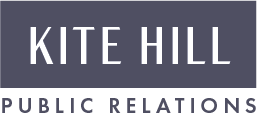During these unprecedented times, connections and transparent conversations are more important than ever. And even more so for business leaders, who are looking to learn from one another about how to approach the challenges of the pandemic and better position their companies for the rebound.
Recently, Kite Hill PR facilitated such a discussion among executives in the advertising and media industries through a closed-door virtual CEO Roundtable. This event was closed-door and under Chatham House Rule, so, unfortunately, we can’t share in-depth insights, but we can share some of the general takeaways.
We covered industry impacts, modes of communication during COVID-19 and recovery. All of the perspectives were interesting. Here is what we can share.
Industry Impacts
Business leaders are spending more time looking at finances and adjusting projections due to client loss and stalled business conversations. M&A activity is slowing down. Companies are being less rigid with clients and more liberal with contracts.
Media consumption is also changing and companies in the sector need to pivot quickly to meet consumer needs and business opportunities. For example, music consumption habits are changing to home speakers and other devices, away from commutes. The ecommerce enablement business is booming.
Some of the lesser discussed side effects revolved around hampered decision-making. Under pressure, decisions are sometimes being made too quickly or without the usual rigor. Especially in light of how quickly COVID-19 is progressing, being strategic is proving to be more challenging. To help counter this trend, a 30/60/90 day plan was discussed as a way to help mitigate rash decisions and focus leadership teams.
Modes of Communication
The digital revolution in media and advertising happened over a decade ago, and most companies are finding the shift to remote work fairly friction-less. What remains a challenge is keeping teams connected and motivated. Many have increased internal comms - formal and informal - to keep engagement and morale up.
The concept of digital body language is also worth paying attention to. For example, is someone typing for long periods of time and then sending just a few words? Are you hearing long pauses and short, curt replies? Being more in tune with these signals can help managers to keep teams engaged. As one of our participants pointed out, when you lose one of your senses, the others get more heightened.
Some companies are also turning to apps like Culture Amp, which allow for quick anonymous polls to help businesses understand how employees are feeling and if certain decisions are impacting morale.
Recovery
Signs of recovery are already happening abroad and business leaders are focusing on China and other regions in APAC to understand what consumer behavior will look like in the EU and U.S.
Another bellwether is the programmatic space, which is projected to be one of the first to see signs of recovery. There were a few competing predictions on how publishers should approach floor pricing and how they’ll likely react, as well as increased adoption of programmatic direct marketplaces.
There was little doubt, however, that the ad tech sector will see further consolidation, and likely for the better. The pace of innovation will accelerate substantially and in the end, we may achieve some big goals like architecting an internet that is not based on the cookie.
As an important final remark, there was a reminder to stay focused on those things that we can control. A recovery will come and devoting attention to the right details now will set companies up for success.
- Gina Preoteasa, Vice President
